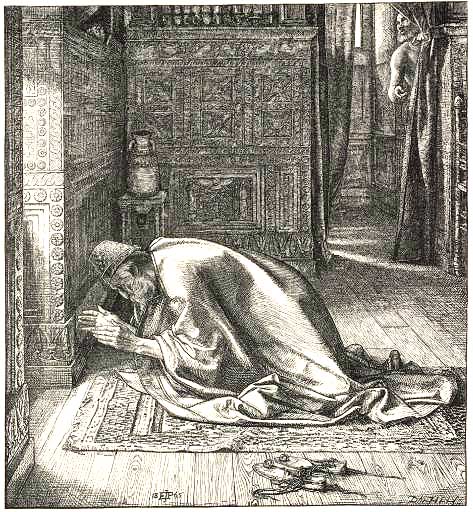
Martyrdom
Rabbi Yehudah HaLevi points to the prayer of Dani’el and asks why Dani’el would risk his life to pray if there is not a mitzvah in the Torah to actually pray. Without an “Oral Law” to explain martyrdom there is no way to know when and where one may become a martyr.2
When Dani’el learned that the writing [prohibiting prayer to anyone other than the king for thirty days] had been inscribed, he went home. He had windows open in his upper story, facing Yerushalayim, and three times a day he fell to his knees and prayed and gave thanks before his God, exactly as he used to do before this. (Dani’el 6:11)3
The first thing to notice is that prayer was a usual occurrence for him and this is not something that he did infrequently.
Second, Dani’el realizes that he cannot bow down to the statue of the king and pray to the king for we are told: “You are not to have any other gods before my presence” (Shemot 20:3).1
Third, obviously Dani’el would have been praying to ask for assistance from God due to the dangerous situation he was in at the time. There are plenty of verses throughout the Tanakh that show various people praying to God for assistance.
Fourth, Dani’el is following the mitzvah as expressed by Shlomo ha-Melekh.
When they sin against You – for there is no man who never sins – and You become angry with them, and You deliver them to an enemy, and their captors take them captive to the enemy’s land, faraway or nearby, and they take it to heart in the land where they were taken captive and they repent and supplicate to You in the land of their captors, saying, “We have sinned; we have been iniquitous; we have been wicked,” and they return to You with all their heart and with all their soul in the land of their enemies who had captured them, and pray to You by way of their land that You gave to their forefathers, and [by way of] the city that You have chosen and [through] the Beit HaMikdash that I built for Your Name – may You hear their prayer and their supplication from Heaven, the foundation of Your abode and carry out their judgment, and forgive Your people who sinned against You, and all their transgressions that they transgressed against You, and let them inspire mercy before their captors, so that they will treat them mercifully. (Melakhim Aleph 8:46-50)3
There is no indication that Dani’el had the intention of becoming a martyr. However, I am sure that he knew it was a possibility but he left that up to God. He continued to follow the mitzvot and put his trust in God. This is no proof for an “Oral Law.”
Offerings
Rabbi Duran notes that Shlomo ha-Melekh offered sacrifices at the dedication of the Beit HaMikdash.2
On that day the king sanctified the interior of the Courtyard that was before the Beit HaMikdash of the Eternal One for there he performed the service of the elevation-offering, the meal-offering and the fats of the peace-offering; for the Copper Altar that was before the Eternal One was too small to contain the elevation-offering, the meal-offering and the fats of the peace-offering. (Melakhim Aleph 8:64)3
The Hebrew word in question according to Rabbi Duran’s argument is עָשָׂה (asah) which is translated as “performed” in this text.2 The word in question – asah – does not necessarily mean “performed” but instead means to do, to make, to produce, to prepare, to appoint, or to put in order. In reality this text can be translated as “On that day the king sanctified the interior of the Courtyard that was before the Beit HaMikdash of the Eternal One for there he prepared [or put in order] the service…” If we translate the verse in this way we can clear up any ambiguities. It is clear that Shlomo ha-Melekh was making preparations for the offerings by bringing forth the prescribed offering to the priests. There is no need for an “Oral Law” in this case since Shlomo ha-Melekh did not actually perform the service himself.
Rabbi Duran also points out the difficulty with Eliyahu’s sacrifice on Har Karmel.2
Eliyahu took twelve stones, corresponding to the number of the tribes B’nei Ya’aqov (to whom the word of the Eternal One came saying, “Your name shall be Yisrael”). He built the stones into an altar for the Name of the Eternal one, and he made a trench large enough to plant two se’ahs of seed around the altar. He arranged the wood, he cut up the bull, and put it on the wood. (Melakhim Aleph 18:31-33)3
Rabbi Duran points out that sacrifices are not permitted anywhere but at the Beit HaMikdash.4
Take … care, lest you offer up your offerings up in any place you might see. Rather, in the place that the Eternal One chooses in one of your tribal-districts,there you are to offer up your offerings, there you are to observe all that I command you. (Devarim 12:13-14)1
We can see that the reason for this command is to stop people from setting up in any place that they see fit to do so. The offerings spoken of in this text are the offerings that are specified in the Torah (such as peace-offerings and sin-offerings). The offering that was offered up by Eliyahu was not any of these types of offerings. The command from Devarim is not applicable to this situation so there is no reason from an “Oral Law.”
———————-
1Everett Fox. The Five Books of Moses. New York: Schocken Books, 1997.
2Gil Student. “The Oral Law.” aishdas.org. The AishDas Soceity, 2001, accessed 15 April 2012. [http://www.aishdas.org/student/oral.htm]
3Nosson Scherman, ed. The Stone Edition Tanakh. New York: Mesorah Publications, Ltd., 2007.
